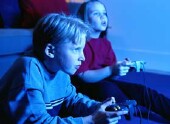
THURSDAY, Dec. 24 (HealthDay News) — Video games have been blamed for everything from promoting youth violence to contributing to childhood obesity, but new research might change the minds of parents who planned on passing by the video game aisle this holiday season.
A new study shows that playing video games can sharpen certain thinking skills, increasing cognitive speed in those who play action games and boosting cognitive accuracy in those who play puzzle-solving games.
The research, led by Rolf Nelson, a psychology professor at Wheaton College in Norton, Mass., involved 20 students who first completed a spatial-location task, then played either an action game or a puzzle-solving game for an hour, after which they repeated the first task. The findings appear in the December issue of the journal Perception.
“Playing a game which requires very fast deployment of visual attention and motor movement could prime a strategy of speed over accuracy,” explained Nelson, “while playing a game which emphasizes a slower, more thoughtful pace could prime the opposite pattern. The main point is that different kinds of video games engage different cognitive and perceptual skills, and there are measurable differences in their effects, even in the short term.”
Similar results have been noted in previous research by Daphne Bavelier, of the University of Rochester in New York. She co-authored a study that showed video game players have improved hand-to-eye coordination, increased visual processing, stronger mental rotation skills and enhanced visuo-spatial memory.
But despite the beneficial aspects garnered from a session or two of gaming, Nelson said more research is needed before making video games part of a child’s homework session. “One difficulty is that video game developers are in the entertainment industry, and the goal is often to capture attention for as long as possible without much regard for how it affects thinking after the game. So, it’s not going to be easy to figure out what kinds of effects any given video game has,” he explained.
With that caveat in mind, it might be premature to purchase video games as holiday gifts in hopes that better grades will soon appear.
Also, noted Chandramallika Basak, a research scientist at Beckman Institute at the University of Illinois, “one needs to take into account developmental changes and cognitive abilities across the life span.”
That being said, if parents want to help their children develop skills in specific areas, Basak suggested selecting those that require those skill sets: puzzle games for accuracy or action games for response times.
Also, said Nelson, some companies have worked on developing training programs for improving cognitive skills and evaluating the effectiveness of their programs. “Maybe they aren’t as attractive to kids as the games that developers spend millions of dollars on, but it’s a step in the right direction,” he noted.
And while gaming might have a place in helping foster certain skills, it can’t replace the physical exercise or social interaction that should be part of childhood development, said Basak. That’s where non-tech options come into play. These include sports, which not only require quick movement response and visuo-spatial skills but also encourage physical fitness, and board games such as Scrabble, which rely on strategy, memory and mental rotation.
“The best training strategy would be something that would have physical fitness, cognitive fitness and social interaction,” said Basak. “If we could get a strategy like that, that would be great.”
More information
There’s more on child cognitive development at the Cincinnati Children’s Hospital Medical Center.

